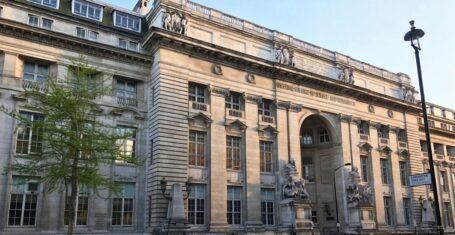
A look inside University College London’s brand new campus, UCL East
Is the future of UCL in Zone 3?
UCL’s brand-new Stratford campus, UCL East, has opened its doors to students and the general public.
It aims to be UCL’s “direct response to the biggest challenges facing people and the planet”. It holds over 60 degrees, accommodation for over 500 students and even world-leading robot dogs and robotic waiters to bring you your cappuccino.
First proposed in 2012 with the vision to transform the Queen Elizabeth Olympic Park into an “ambitious cultural and educational district,” the project has cost over £487 million, and took four years to construct. It is UCL’s single largest expansion in its history.

World-leading research and facilities – including these robotic waiters
September 2023 marked the formal opening of “the first phase” of UCL East, with both of its buildings finally open to both students and the public. UCL’s Provost and President, Dr Michael Spence, described it as “an extraordinary contribution to London, the UK and the world.”
Marshgate, the campus’ flagship academic building, opened this September. It boasts an impressive eight floors of cutting-edge laboratories, student facilities and social spaces, with “fluid zones” for both academic facilities and community engagement.
World-leading research facilities include a range of facilities, including a variable luminance artificial sky dome laboratory, a human thermal chamber, global disability innovation hub, and various other laboratories, studio spaces and resources.
Student spaces include a library, refectory, cafe, lecture theatres, professional kitchens, pottery studios, and more.

The Arcellor-Mittal Orbit – UCL East’s BT tower equivalent?
Most Read
One Pool Street is the main accommodation building, hosting over 500 brand-new bedrooms. Communal spaces are open to all UCL students, and feature a ‘student centre’ style area for studying, a cafe, various laboratories including the Robotics and Autonomous Systems Centre, and a brand new 160-seat cinema.
UCL’s Provost Dr Michael Spence hailed the construction of UCL East. He said: “Our new campus is the culmination of years of hard work alongside local and global partners who share our vision and passion for excellence.
“At East Bank, we are part of an investment of young minds and energy to drive local innovation that can transform lives, as we collectively seek to create a more inclusive, equitable and sustainable world for generations to come.”

One Pool Street: State of the art, riverside student accommodation
Despite the world-leading facilities and brand-new campus, UCL East’s construction has not been without controversy.
Its flagship accommodation at Pool Street hit a three-month construction delay, forcing new students to be temporarily housed in hotels.
Some students are also concerned over the convenience of living or studying at a campus over 40 minutes’ commute and several tube lines away from UCL’s main Bloomsbury campus.
One UCL-East based student said: “The facilities are great, but I’m not sure it’s worth the inconvenience. I also have classes at the main campus which are over 45 minutes away, and a lot of the resources we need will be found at libraries on the Main Campus. I also feel for the students living here, paying for expensive accommodation so far from where their degree is based. That’s a long commute to take twice a day, every day.”
Critics of the new campus also question its hefty price tag despite only catering for 4,000 students, all of whom are new. In response to plans for UCL East in 2018, academics overwhelmingly backed a motion of no confidence in its management. They argued that investing so much in a new campus that would only host a fraction of UCL’s enormous student body – today numbering 53,000 – was a waste of money.
A UCL spokesperson said: “With over 50 new cross-disciplinary and interdisciplinary degree programmes based at UCL East, the students living on the new campus form part of a tight-knit community, while retaining close links to our readily accessible Bloomsbury campus.
“UCL East is more than just an expansion for UCL, as the new facilities are hosting leading-edge research centres spanning a range of disciplines, such as the Advanced Propulsion Lab which will focus on decarbonisation of the transport sector, and the Manufacturing Futures Lab which aims to future-proof manufacturing in a world where sustainability is essential.
“Based at East Bank, our students and staff are part of a larger collective of young minds, devising new ways to create a more inclusive, equitable and sustainable world. We give our students the space and tools to work across disciplines, in shared labs, studios and workshops, as they develop novel solutions to global and local social and environmental issues.”
Related articles recommended by this author:
• University College London launches first ever LGBTQ+ action plan
• Six reasons why Camden is the most overrated area for student living
• ‘Horrific incitement to violence’: Jewish students’ union slams UCL-UCU Palestine stance




















